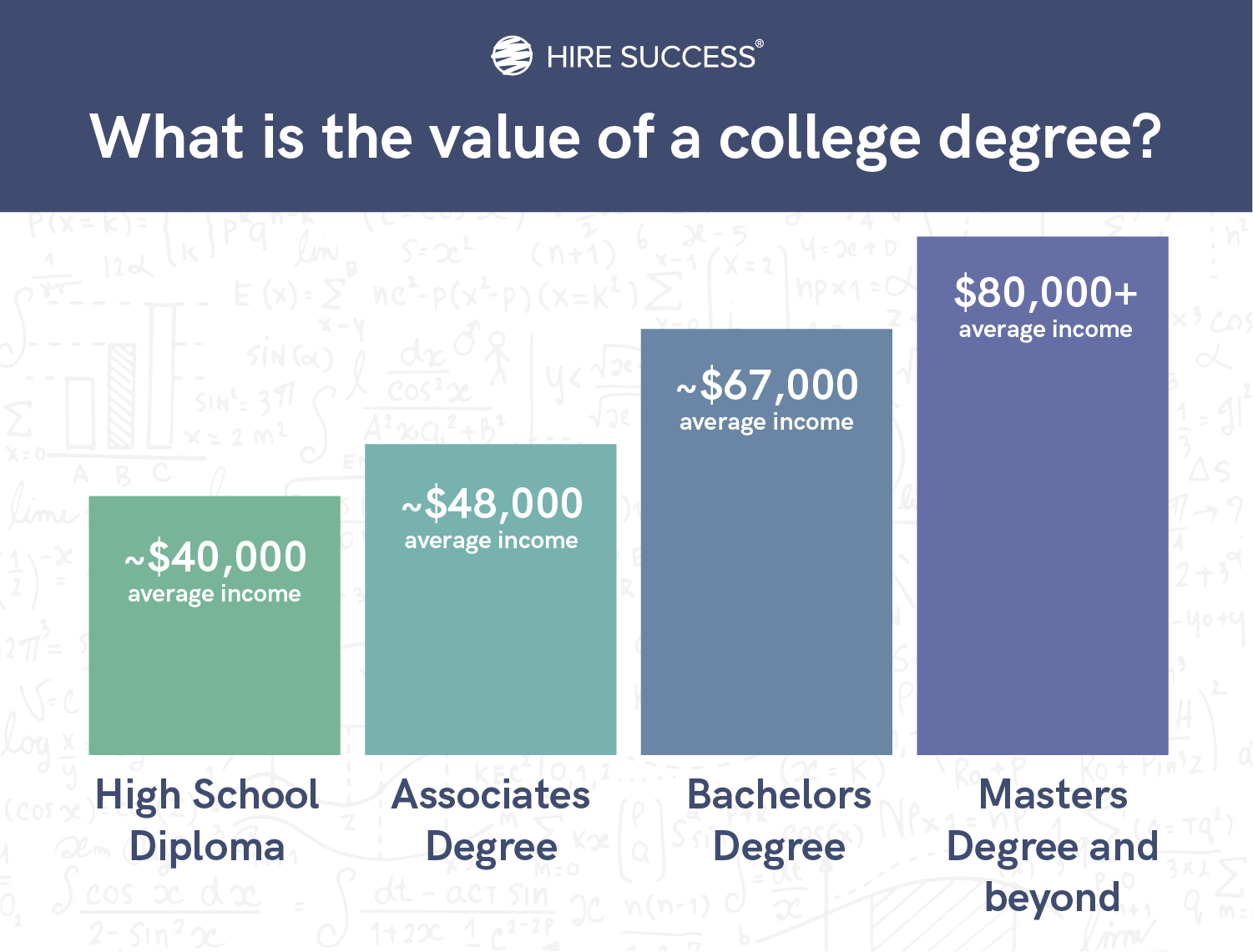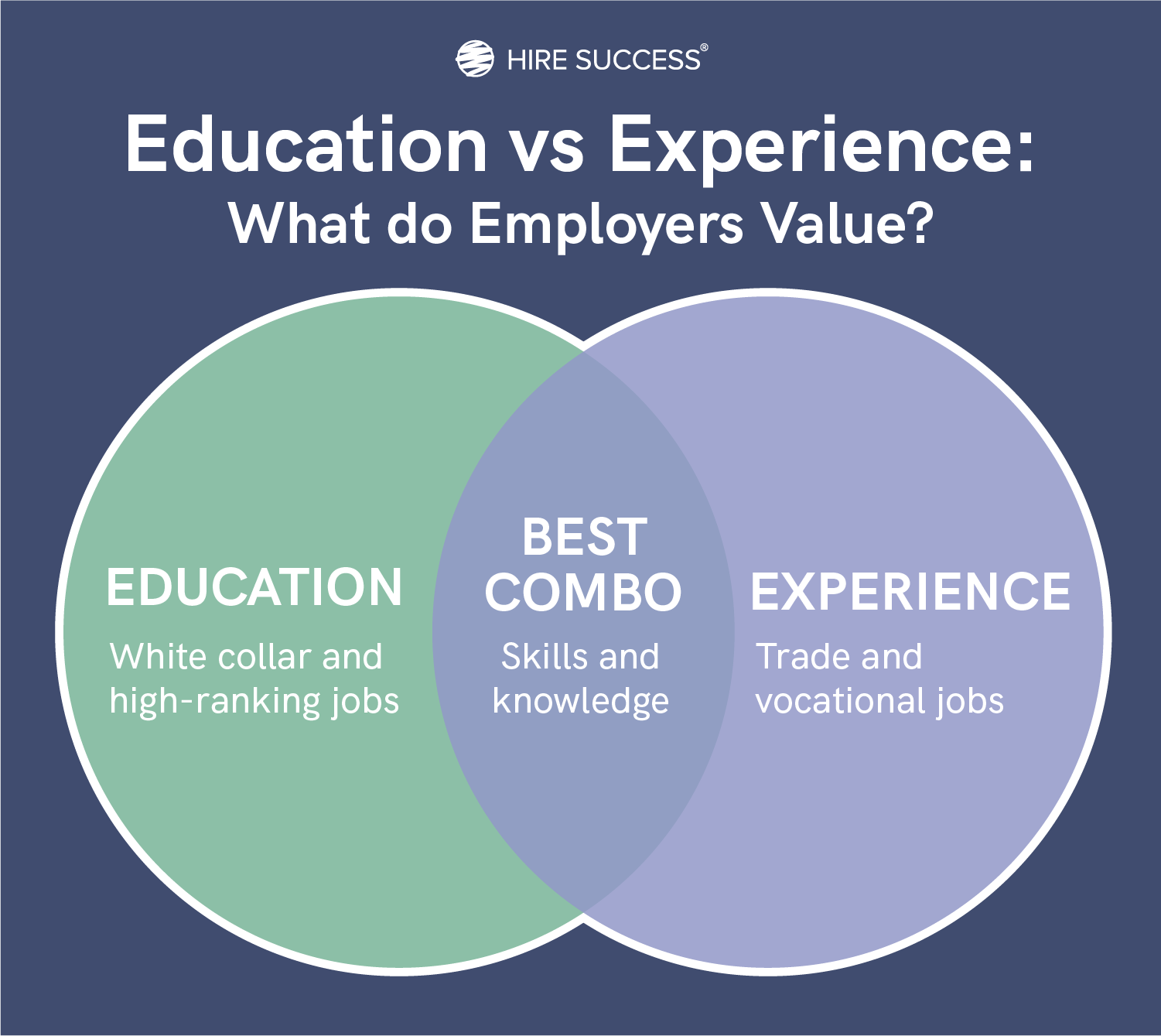When you browse job listings, you quickly notice that employers are still looking to hire college graduates for many office jobs. Most white collar job postings and many trade jobs list a bachelor’s degree or higher as a requirement. Many employers want new hires to have experience in addition to education. However, this traditional, cookie-cutter approach to hiring may limit your applicant pool, exclude great potential and leave you with a substandard employee whose greatest achievement was not failing for four years.
The key to hiring is to reject traditional methods and adopt data-driven success metrics. You can hire with confidence by using the right tools and knowledge, knowing the person you choose has the skills and traits to be successful in the position whether or not they have a college degree.
Is a college degree still valuable?

With unemployment at historic lows, people switching jobs at record pace, and the gig economy in full swing, you may be surprised to learn the value of a college degree is not decreasing. The data is clear, the higher your degree, the more you earn. With a high school degree, you can expect to earn about $781 per week, a master’s degree $1,545, and a professional or doctorate degree $1,885.
However, in some industries, other factors such as experience and skills may offset lack of education. More and more employers are relying on testing to find talented prospects who may not be as impressive on paper.
Which do employers value: education or experience?
Whether employers care about college over experience usually depends on the industry and position open. To fill trade or vocational jobs, employers usually depend on skill based hiring. For example, experience is far more desirable than a degree when hiring a delivery driver or security guard.
However, many jobs require a certain level of education. Degree based hiring is common for white collar and high-ranking jobs, such as administrator.
Other job postings list experience plus a specific degree. Some may waive a degree with plenty of experience combined with the skills or personality trait values foreshadowing success. It depends.

Can work experience replace education?
This is a tricky question that depends heavily on the job and applicant. If you’re hiring a cabinet maker, four years of woodworking experience is far more valuable than four years spent earning a degree.
The same can be true of tech workers. Bill Gates famously dropped out of Harvard to start his own business. You may be surprised to learn that Steve Jobs (Apple), Michael Dell (Dell), Elon Musk (Paypal, Tesla), and Mark Zuckerberg (Meta) are also college dropouts. Can you imagine not hiring one of them because of that?
These are extreme examples and not every college dropout is a brilliant entrepreneur who succeeds beyond their wildest dreams. There are still plenty of bright, innovative minds out there who can’t afford to consider college and don’t have the backing to launch a business. The problem is identifying these budding geniuses with unimpressive educations.
Skill based hiring vs degree based hiring
Degrees are useful and necessary for many positions that require intricate knowledge. Surgeons are the most obvious example. Surgery is not something you can learn from YouTube videos. Other good examples include accountants, professors, and lawyers. Degree-based hiring makes sense for these positions.
Skill based hiring makes more sense for far more jobs, including managerial positions. Another important consideration is personality; whether a new hire is the right fit for both the position and the team.
Bill Wednieski, Managing Director of the recruiting agency The Headhunters, gave Hire Success® some candid advice about hiring the right person.
“In my business, I talk to many hiring managers who don't have a lot of patience,” Wednieski stated. “They don’t want to hold anybody's hand. They want candidates who can hit the ground running. That requires experience.”
“And then I have managers representing very warm, open team cultures,” Wednieski continued. “They want people who fit into the culture. It’s not going to work if they hire people with the wrong type of personality. Candidly, you can't put a bull with a bull.
“So I screen out any candidate whose personality would clash with the team.”
The challenge for every human resources manager is finding candidates with the combination of skills, personality, education, and experience to be productive and successful in the job.
Invest in future performance, predict long-term fit
Use our personality assessment to identify candidates who will thrive in their role and in your evolving organization.
Book a Demo Try It Free
Why do employers still require a college degree?
College degrees can certainly be valuable, but they only represent one possible metric to determine success in a position. While degree inflation — the trend of seeking applicants with a degree for a job traditionally held by people without a degree — may introduce more educated workers, it does not always translate to more successful employees.
In 2017, Harvard Business School researchers analyzed 26 million job postings and found a clear preference for college degrees. To complete the report, they asked 600 business and HR professionals about their experiences.
The most interesting finding: “Employers generally perceive degreed and non-degreed workers in the same occupation as nearly or equally productive on many performance metrics.”
In fact, most reported paying degreed applicants significantly more and not seeing a difference in productivity between employees with or without degrees. So why do employers require a bachelor's degree?
The inexplicable drive for employees with degrees has a chilling effect on the middle class. People perfectly capable of doing jobs, often even for less, are excluded before they even apply. At the same time, it narrows the applicant pool for employers.
“Degree inflation is corrosive to U.S. competitiveness in two ways,” said Joseph Fuller, a professor of management practice at Harvard Business School. “It slams the door of opportunity in the face of Americans with the experience to do a job or the aptitude to grow into it. It simultaneously makes it harder for American companies to find and retain affordable talent.”
When it comes to education versus experience, it’s time to rethink the hiring process for many positions.
How degree inflation affects employability
For job seekers, unnecessary degree requirements limit the jobs they can apply for, even if they have the required skills and experience. And since white people and people from countries where higher education is cheap are more likely to have the required degrees, it limits their applicant pool and results in less diversity in the workplace.
Degree inflation ultimately chips away at the middle class. As degree requirements are added to more job postings that traditionally did not call for degrees, people without degrees are excluded. This makes it increasingly hard for people without college degrees to earn a viable living.
There are some encouraging signs of change, especially in tech fields. Apple CEO Tim Cook has said that 47% of Apple employees do not have college degrees. The Apple initiative, Everyone Can Code, is a globally distributed learning program that begins as early as kindergarten and is used in training facilities, schools, and state colleges. The goal is to teach essential skills to any child or adult willing to learn about coding.
As we move further into the IoT, more high-paying jobs are opening to talented tech people who do not have a college degree. This is happening even as middle management jobs are lost to the perceived - but not always actualized - value of a college degree.
The lifetime of a college degree
Given other indicators of job success, you may wonder if the value of a college degree is decreasing. The undeniable answer is no. As demonstrated by the Harvard study, employers do care about college degrees and research says it pays off throughout the graduate’s lifetime. Not only do they earn more on average than most people without a degree, they enjoy more job stability.
A Georgetown University study showed that during the 2020 COVID-19 lockdown, workers with more education were more likely to keep their jobs and work remotely.
The same research revealed that factors other than education influence lifetime wages. Age, field of study, occupation, gender, race and ethnicity and geography all play a part. Women earn less than men, Asian and white people earn more than other ethnicities and architecture and engineering majors are the highest paid people with bachelor’s degrees.
To put earnings in perspective, the average worker with a high school degree or GED earns a median of $1.6 million during their lifetime. In comparison, a worker with a bachelor's degree earns a median of $2.8 million during their lifetime.
A better way to predict employee performance
The most significant hiring challenge is checking off all the boxes to give a new hire the best chance of being successful in their role. Sometimes, an even bigger challenge is determining which boxes need to be checked.
Hire Success® is here to help you with recruitment tools to help you improve your hiring process. These tools enable you to build success profiles based on the skills, aptitude and personality. You’ll find your best workers, identify candidates that best fit the success profiles, and conduct targeted interviews designed to uncover what you really want to know.
Use Hire Success®’ data-driven assessment tools to find out if the candidates in your application pool with the most impressive degrees are really the best fit for the job or a waste of money. Bad hires are costly and what makes a good hire might just surprise you.


